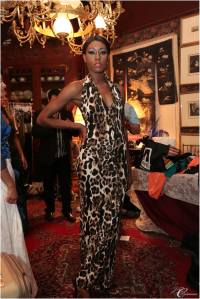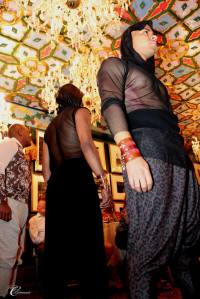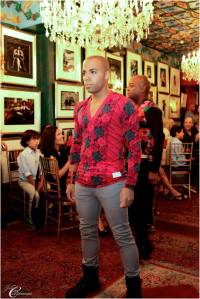Tag Archives: social media
AIDS.Gov Black Voices: THE TRUTH ABOUT MY POSITIVE EXPERIENCE

Ken Williams
There are a few things I want you to know about my positive experience. Whether you’ve worked in HIV for decades or are new to the epidemic, we all start somewhere. I’m a filmmaker and, ironically, my first introduction to the epidemic was through film. It was film where I started and film where I continue to this day.
Well before I became positive, my first in-depth look into the HIV epidemic was through the lens of a film called Philadelphia. For two hours I watched Tom Hanks’ character die on screen. What I took away from watching Philadelphia was that the typical HIV positive experience can be one of rejection and discrimination. It can be a stigmatized and demoralizing experience. Some people may think that your fate is considered your fault. As a person who has been living with HIV for four years, I now know this is not true.
The truth about my positive experience is that my life can often be seriously impacted by the social and physical implications of living with HIV. Almost every day, living with HIV means something different to me. Some days I feel hopeful because I take my medications and stay in care, while on other days, I feel shame because I am confronted head on by the stigma that is associated with living with HIV, leaving me feeling that I need to remain silent about my disease for fear of ridicule; the expectation that I must be dangerous because I am living with HIV. Having tested HIV positive just 4 years ago, I am still adjusting. Adjusting to how best to deal with stigma; how best to understand and manage what is happening in my body; how best to keep moving forward.
Much of this adjustment, for me, at least, is best handled by practicing optimism instead of fear. Optimism brought on by scientific advances; optimism brought on by my own personal growth and understanding of how to live a healthy life with HIV; and optimism that we are now talking about the real possibility of a generation free of HIV/AIDS. I learn daily and I listen to the outpouring of similar stories in my community and I take my meds and I live! I live despite the stigma. I live despite the fear. I share my story behind and in front of the camera and through these stories and connections I stay hopeful. I hope for an AIDS-free generation and a generation free of the stigma and fear and blame. I hope for a generation where I can continue to share my truths. My optimism drives me to want to see that generation.
What are you doing each day to bring us all to an AIDS-free generation?
– See more at: http://blog.aids.gov/2014/08/the-truth-about-my-positive-experience.html#sthash.1A8VLl08.dpuf
Open That Closet Door Fashion Show – Time To Take It To The Cat Walk!
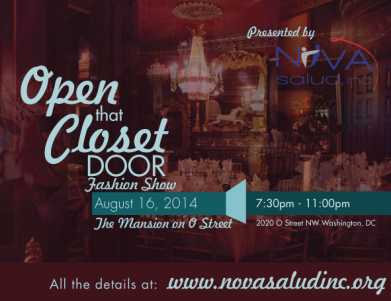
Nova Salud put on another amazing event as myself and other individuals who are affected by HIV took time out of their schedules to model amazing clothes by Juan Jose Saenz-Ferreyros and his line Ferreyros Couture Company. Thank you all who came out to give back to Nova Salud as they continue to provide excellent services to the Northern Virginia region. Also, a huge thank you for all the sponsors and O Mansion for making this event happen.
For more information on Nova Salud click here.
The Need for Unsure Positive
I am honestly excited about this project and want to see it succeed. Currently, there are no programs that discuss life living with HIV from a protagonist and their point of view. This is something that we so desperately need to educate more individuals, break down stigma, but most importantly have something that us individuals living with HIV can related to. Please check out http://www.unsurepositiveseries.com for more information on the project and the kickstarter campaign!
 https://www.youtube.com/watch?v=5jv4IoRSGvw Real HIV? Nowhere on T.V.! This series will explore many of the issues that affect HIV-positive people as they live on, and stay positive. Unsure/Positive is a Dramedy. What exactly is a Dramedy, you ask? Also known as tragicomedy, comedic drama, seriocomedy, or Unsure/Positive (the Series). Humor and Drama combined! A hybrid! The primary goal of the series is to entertain. Fair warning: we may entertain you *while* raising awareness about life with HIV. In an age of mobile devices, hookup culture, antiretroviral treatments, and the ongoing stigma that resonates with our own societal fears, Unsure/Positive offers a healthy dose of reality, honesty, and humor. You haven’t seen anything like this (because we’re still busy making it happen!) We have a fantastic cast, a baller crew, and we’re itching to get started– so much so that we already shot the first ten pages of our script on July 12th and 13th, 2014— well before securing our Kickstarter funding. The plan? To show you what you’re backing. Our sneak preview can be viewed right here: HIV is no longer a death sentence. That’s (somewhat) common knowledge… so much so that the other complications of living with the disease often get overlooked. The social stigma of an HIV-positive diagnosis is, on its own, a serious ongoing issue for “poz” persons. Unsure/Positive will explore this, and also the variety of situations– stark and mundane– that come up when human beings try to grapple with this complicated disease. With Your Help They Can:
https://www.youtube.com/watch?v=5jv4IoRSGvw Real HIV? Nowhere on T.V.! This series will explore many of the issues that affect HIV-positive people as they live on, and stay positive. Unsure/Positive is a Dramedy. What exactly is a Dramedy, you ask? Also known as tragicomedy, comedic drama, seriocomedy, or Unsure/Positive (the Series). Humor and Drama combined! A hybrid! The primary goal of the series is to entertain. Fair warning: we may entertain you *while* raising awareness about life with HIV. In an age of mobile devices, hookup culture, antiretroviral treatments, and the ongoing stigma that resonates with our own societal fears, Unsure/Positive offers a healthy dose of reality, honesty, and humor. You haven’t seen anything like this (because we’re still busy making it happen!) We have a fantastic cast, a baller crew, and we’re itching to get started– so much so that we already shot the first ten pages of our script on July 12th and 13th, 2014— well before securing our Kickstarter funding. The plan? To show you what you’re backing. Our sneak preview can be viewed right here: HIV is no longer a death sentence. That’s (somewhat) common knowledge… so much so that the other complications of living with the disease often get overlooked. The social stigma of an HIV-positive diagnosis is, on its own, a serious ongoing issue for “poz” persons. Unsure/Positive will explore this, and also the variety of situations– stark and mundane– that come up when human beings try to grapple with this complicated disease. With Your Help They Can:
- Pay our professional director of photography, Ben Proulx (this is the guy in charge of the camera!)
- Feed our cast and crew for (at least) 8 days (nom-nom!)
- Pay our awesome, hardworking crewpeoples
- Cover the cost of liability insurance
- Secure a U-Haul for equipment pick-up and return
- Buy cases of water for our set (You don’t know muggy till you’ve been in Boston in August!)
- Buy a hard-drive on which to save all our footage
- Buy a second hard-drive. (Just in case!)
- Work with a professional sound mixer during post production
- Work with a professional colorist during post production
- And more!
Thanks in advance for supporting our project. We look forward to bringing you this brand new series very soon!
Black Voices Bloggers on National HIV Testing Day and Social Media
June 27th is National HIV Testing Day (NHTD) and the theme for this year is “Take the Test. Take Control”. In recognition of this observance day, our Black Voices series bloggers answer the question why NHTD is important to them and what is one thing people (or organizations) can do to promote NHTD. Here is what they said:
Why is National HIV Testing Day important to you?
“This month marks my 7th year of living with HIV. I found out I was HIV positive on June 7, 2007 after receiving a positive diagnosis during an attempt to enlist into the United States Army. After I found out I was devastated, but also determined to survive and THRIVE. In order to do this, I knew I needed to manage my HIV and take control of my health. Taking this HIV test was the first step to making sure I remained healthy. Seven years later, I am still healthy with my HIV undetectable.” –Venton
“National HIV Testing Day is important to me because it’s a day that reaffirms the value of routine testing. It reopens the conversation about sexual health and risk to people in communities where either the conversation has fallen off or never been had. National HIV Testing Day becomes a marker, in the year, for many who might not otherwise engage in this type of dialogue.” – Ken
“National HIV Testing Day is important to me because it is an opportunity to know your status. With taking the test, and whatever the test results, you can take the necessary steps to educate yourself on HIV. If you are negative you can take the steps to remain negative (i.e. harm-reduction techniques and PrEP), and if you are positive you can get linked to care (with the goal of viral suppression). The day is also a perfect day to educate others on HIV and really let the community know that this is still an issue we are dealing with.” –Patrick
“NHTD is important because it provides an opportunity to put a face and voice on what HIV looks and sounds like. It’s an opportunity to continue an important conversation about our individual and collective health and wellness and the important work of eradicating stigma.” –Meico
“This day is a national coordinated effort to encourage Americans to get tested for HIV. It gives me a chance to speak with my friends and loved ones about HIV. Additionally, it allows me to support AIDS service organizations in promoting the day and amplifying their messages online.”-Anthony
What is one thing people (or organizations) can do to promote National HIV Testing Day?
“We’re all impacted (directly or indirectly) by HIV. You can help promote NHTD by sharing your story. As appropriate, send a text to your best friend. Call your mom. Chat-up one of your co-workers. Wondering how to start the conversation? Check out these great conversation starters from the CDC.” -Meico
“People and organizations can use social media and their networks to have a conversation about HIV. Ask friends, family, and colleagues if they know their HIV status and help them find a place they can get tested (using the locator.aids.gov website or application of course).” -Patrick
“Social media has been a great tool to help spread the word about the importance of National HIV Testing Day. So many people still do not know their status and it is important for people to be aware and informed about the steps they need to take in order to stay negative or, if positive, to get into care.” -Venton
“Participate. Participate. Participate. National HIV Testing Day for me is about the grassroots process of getting the education out to those who need it. You can also set the example by taking a test and sharing your experience with family members, the faith community and colleagues. It’s really about asking yourself: ‘how can I keep the conversation going?’ ” -Ken
What’s one thing you’re doing to promote National HIV Testing Day?
– See more at: http://blog.aids.gov/2014/06/black-voices-bloggers-on-national-hiv-testing-day-and-social-media.html#sthash.FX8cGSwV.dpuf
Perspective Not-So-Social-Network
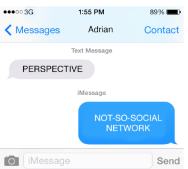 We rely on technology so much now that we often miss precious moments. In my experience, dinners are no longer focused on spending time with family and friends around the table engaging in conversation with one another. Instead, people text or update their social media accounts. We have become afraid to approach someone for conversation or even befriend someone while waiting for a bus or striking up a conversation at a coffeehouse for fear of seeming weird or intrusive. All of this leads me to believe that social media isn’t really all that social.
We rely on technology so much now that we often miss precious moments. In my experience, dinners are no longer focused on spending time with family and friends around the table engaging in conversation with one another. Instead, people text or update their social media accounts. We have become afraid to approach someone for conversation or even befriend someone while waiting for a bus or striking up a conversation at a coffeehouse for fear of seeming weird or intrusive. All of this leads me to believe that social media isn’t really all that social.
|
|
There are many people who defend social media and technology, and I can agree with some of their arguments. Social media allows us to keep up with the lives of our friends and families in a more simplistic and convenient way. Instead of making a long distance call to a relative just to see how they are doing, you can simply look on their Facebook page. Social media also enables us to share some of our most special moments with our families, friends and the world.I will admit it is great to have the opportunity to share so many special moments in our lives in a broadcast manner, but how special are these moments if we are ignoring those who are with us in those moments? I hear more and more people say they feel alone. I can understand this sentiment because the norm is to not be fully engaged in a conversation or fully connect. Instead, the norm is to be texting or updating a social media status as you are talking to others. Likewise, the norm is parenting through social media or some type of electronic device.
|
Will You Support Patrick?
To donate and help me reach my fundraising goal please go to:https://www.crowdrise.com/TeamGrassrootsFULL/fundraiser/patrickkay
Over $18,000 raised last year let’s do even more!
The Grassroot Project serves to educate at-risk youth from Washington D.C. about HIV/AIDS awareness and prevention by utilizing Division I “student-athlete” role models. Founded in January 2009, The Grassroot Project is one of the first 501(c)(3) organizations to be designed, initiated, and managed completely by NCAA Division I varsity athletes encompassing athletes from Georgetown University, George Washington University, Howard University and University of Maryland. We are also unique in our approach to HIV/AIDS prevention—instead of using a traditional education program that is lecture-based and taught by teachers or health educators, we use games that teach lessons and athletes as our messengers.
Mission:
The mission of The Grassroot Project is to use sports to educate at-risk youth in the community about HIV/AIDS awareness and prevention. Our curriculum focuses on creating a fun, friendly and safe environment in which youth learn healthy life styles. The programs allow kids to share their feelings and beliefs, increase knowledge, and develop healthy attitudes and behaviors pertaining to HIV/AIDS through the use of interactive games and activities. By using the vehicle of sports to influence social change, student athletes use the curriculum to combat the high rate of HIV/AIDS in D.C
Check out http://www.grassrootsproject.org
Young Black Gay/Bisexual/Queer/Trans Men are In!
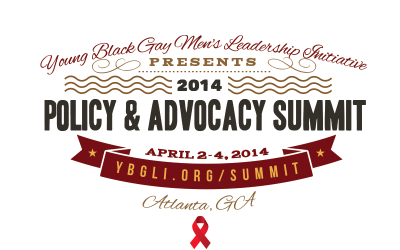 April second through the fourth saw 55 young black men from across the nation to meet in Atlanta, Georgia for the YBGLI’s second Policy and Advocacy Summit. When I confirmed to my parents that I was gay so many years ago they warned me that my life would be very difficult, and that it would be full of barriers that would require me to be the very best in everything that I do. This belief stayed within and made me believe until more recently that if I was not perfect or the best in whatever I was attempting then there was no reason trying to pursue.
April second through the fourth saw 55 young black men from across the nation to meet in Atlanta, Georgia for the YBGLI’s second Policy and Advocacy Summit. When I confirmed to my parents that I was gay so many years ago they warned me that my life would be very difficult, and that it would be full of barriers that would require me to be the very best in everything that I do. This belief stayed within and made me believe until more recently that if I was not perfect or the best in whatever I was attempting then there was no reason trying to pursue.
While on my flight heading to Atlanta so many thoughts were running through my head. I really wanted to work hard to learn as much as possible and network. I am not going to lie when I felt as if the summit would be the same as any other conference, which would be information overload and maybe some opportunities to network. We all met downstairs to talk and network before walking over to the location we had our first session waiting for us. It was a great opportunity because it was a happy hour. This allowed us to begin the process to truly get to know each other. It was truly great to see old friends but have the ability to start the process of making new ones. Our first night had us at The Evolution Project. The Evolution Project is a drop-in community center for young black gay/bisexual men and transgender individuals between 18 and 28 years of age. There we got an overview of the drop-in center, listened to representatives of AID Atlanta and the state health department, and got to hear from Jose R. Rodriguez-Diaz who is the CEO of AID Atlanta. We then received a presentation on the Affordable Care Act and then had a private screening of Blackbird by Patrik-Ian Polk.
Throughout the next day and a half we discussed health disparities, policy, advocacy, HIV prevention among Young Black Men Who Have Sex with Men (YBMSM), research, leadership, Feminism and its importance to Black Gay Men, and personal development & personal branding. The always-fantastic Testing Makes Us Stronger Team gave a presentation on their program to us before the Twitter Town Hall that will forever remain one of the most interesting experiences of my life.
On the final day, we had two very special events and both of them I will cherish for the rest of my life. We had the pleasure of having Dr. Theo Hodge, whom is a provider in DC, yet shared his story about his experiences in the district during the AIDS epidemic. Hearing him tell the stories of having clients taking HIV medications in the handfuls, the effects of AZT that were physically noticeable, and more importantly reviewing the timeline of then to here. The recording of the presentation needs to happen so it has the opportunity to play for every Young Black Gay Man (heck everyone) who is not familiar with the history of HIV. Our group truly enjoyed his charisma and his ability to convey such a serious story in a way to continue to engage us throughout our time together. Finally, the last session of the summit was one where Dr. David Malebranche, Dr. Sheldon D. Fields, Robert Miller, and Mr. Bernard Owens each gave us their stories and additional encouragement. I cannot tell you how much I saw the future me in these men. Each of them made me feel so comfortable I was able to break down my walls of protection and cry on their shoulders. I finally was able to let out my internalized stress and express my frustrations in a space where I felt as if I did not have to be either politically correct or forced to give some bullshit pageant reply like “I just want world piece.” It is truly a blessing to be in this position; however, it sometimes makes me feel extra diligent to stay on my Ps and Qs (even if that means saving those conversations for ‘kitchen table talk’). Immediately they offered their experiences and friendships and I am happy to say that post YGBLI’s Policy and Advocacy Summit we are still in contact and their words and perspectives have been invaluable. Having this opportunity would have been very difficult to achieve outside of this space.
This summit was definitely a success and far exceeded my expectations. The participants were very diverse and came from different geographical areas and professional (not just HIV). Topics were set but we had the ability to truly dissect what we were discussing, even if it transitioned off-topic for a bit. Having the ability to speak to representatives of our government agencies (CDC, HRSA, SAMHSA, and the Georgia Department of Public Health) gave us the ability to voice our concerns, thoughts, and ideas. The lack of job vacancies/internships and leadership positions, slow approval times for marketing materials, lack of funding to rural and other low socioeconomic communities that are seeing a rise in HIV, lack of cultural competency, and a vast array of others issues that were mentioned during this time period. I concern I had was that many of the representatives on the panel were white and only two members participating were Black. This is a perfect reminder that we need to have more opportunities to have Young Black Men Who Have Sex with Men (to include those who are HIV-positive) to fill these seats in the future to ensure that decisions made for us are created by and come from us. A huge shout-out though goes to Mr. Harold Phillips of HRSA who saw a need to address our questions due to the lack of time/ability of those reps on the panel to answer them. He graciously volunteered his own time to say back lack from 12am-1am to answer any of the questions he could. During this time, our awesome Organizing Committee Members took who concerns down and later brought them up with Douglas Brooks, the New Director  of the Office of National AIDS Policy (ONAP). Feeling as if we had a voice was very empowering. Having that experience has and will continue to ensure engage my government on concerning issues.
of the Office of National AIDS Policy (ONAP). Feeling as if we had a voice was very empowering. Having that experience has and will continue to ensure engage my government on concerning issues.
The Policy and Advocacy Summit allowed for the formation of new relationships and partnership .It was like a beginning of a new brotherhood. From my end, there were phenomenal conversations and I cannot wait to announce fantastic news in the coming weeks! Addressing surviving as an YBMSM professional, leadership, and more importantly branding made me look at myself and analyze ways I can still to this day continue to seek self-improvement. This summit created a space where we could exchange stories, ideas, experiences, and more importantly continued support for one another. To this day, I am still in contact with many of my new friends and colleagues as we check in or support each other through the struggles of being an YBMSM in a society that has serious issues accepting us as social norms.
Coming to a close of the summit Daniel Driffin, Chair of the Organizing Committee for YBGLI said something that we all took back to our homes, careers, and everyday lives. This was that our voice does matter, no matter where we were, no matter how hard the struggle was, and no matter how much we felt like our voices were unheard. This can seem very frustrating at jobs or ASOs where our advice or knowledge isn’t used; we continue to be disenfranchised; we deal with disrespect or ignorance from Cisgender white men (even gay) who do not truly understand the struggles and barriers of being a young Black Man who loves Men. These men still face a huge war within our own communities, to include mainstream society. His words really were soothing and helped to bury anger and resentment I had from some of those situations. In the end, I truly hope that this summit continues and wish that many more could take place across the country. If we can get more YBMSMs to go through a program like this, our community would see an increase in advocacy, activism, enlightenment, and progression toward more solidarity.
we felt like our voices were unheard. This can seem very frustrating at jobs or ASOs where our advice or knowledge isn’t used; we continue to be disenfranchised; we deal with disrespect or ignorance from Cisgender white men (even gay) who do not truly understand the struggles and barriers of being a young Black Man who loves Men. These men still face a huge war within our own communities, to include mainstream society. His words really were soothing and helped to bury anger and resentment I had from some of those situations. In the end, I truly hope that this summit continues and wish that many more could take place across the country. If we can get more YBMSMs to go through a program like this, our community would see an increase in advocacy, activism, enlightenment, and progression toward more solidarity.
A very special thank you goes out to NGBMAC, NASTAD, The City of Atlanta, AID Atlanta, The Evolution Project, Testing Makes Us Stronger, Sphere Lab, The Red Door Foundation, Inc., AIDS.gov, Gilead, San Francisco AIDS Foundation, Georgia Department of Health, Impulse Group, AHF, Hudson Grille, Patrik-Ian Polk, HRC, Broadway Cares, Levi Strauss Foundation, Renaissance Atlanta Midtown Hotel, Summit Faculty, OC Members, and more importantly the participants for making this event happen. For more information check out www.ybgli.org
HIV in Rural Communities (pt.1)
Check out my new series that discusses HIV in rural communities. I interview individuals who are actually on the ground leading the fight against this growing epidemic in rural Virginia. Please share and spread the word!
Edugaytion: New Year New Me
Check me out being featured on Edugaytion’s live stream. This can also be downloaded via the iTunes store under podcasts! Don’t forget to check out Edugaytion!

